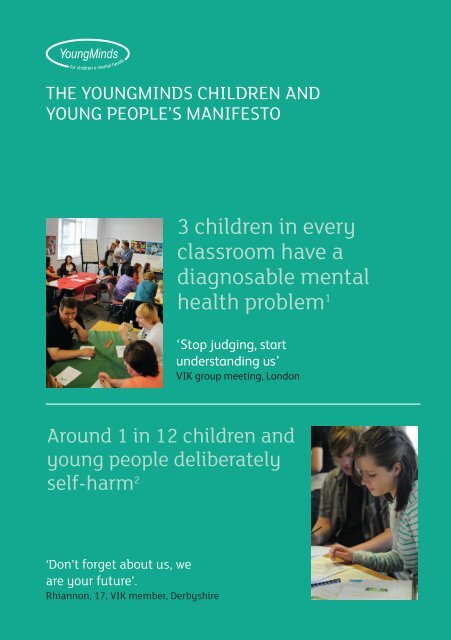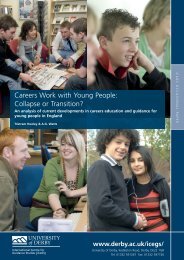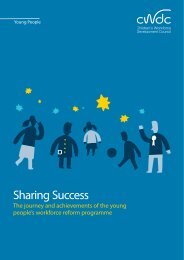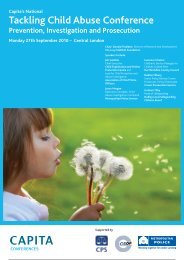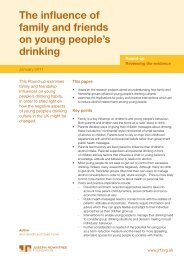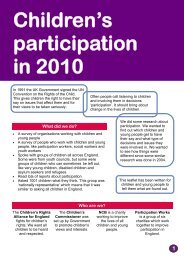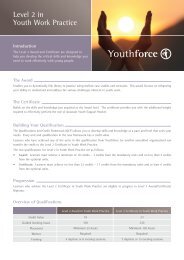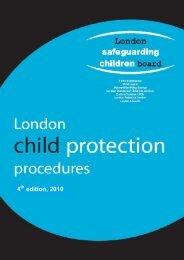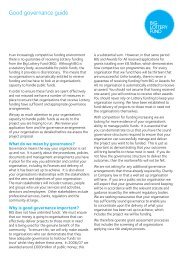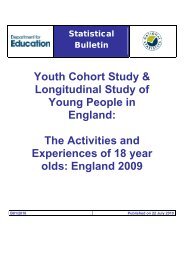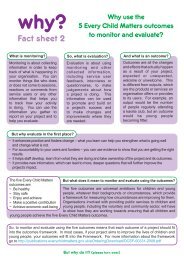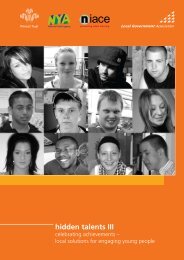manifesto - Partnership for Young London
manifesto - Partnership for Young London
manifesto - Partnership for Young London
Create successful ePaper yourself
Turn your PDF publications into a flip-book with our unique Google optimized e-Paper software.
<strong>Young</strong>Minds<br />
<strong>for</strong> children s mental health<br />
THE YOUNGMINDS CHILDREN AND<br />
YOUNG PEOPLE’S MANIFESTO<br />
3 children in every<br />
classroom have a<br />
diagnosable mental<br />
health problem 1<br />
‘Stop judging, start<br />
understanding us’<br />
VIK group meeting, <strong>London</strong><br />
Around 1 in 12 children and<br />
young people deliberately<br />
self-harm 2<br />
‘Don’t <strong>for</strong>get about us, we<br />
are your future’.<br />
Rhiannon, 17, VIK member, Derbyshire<br />
young minds booklet A5.indd 1 03/07/2009 15:46
Mental health is as important as physical health and needs to<br />
be everyone’s business.<br />
This <strong>manifesto</strong> has been created by <strong>Young</strong>Minds Very Important Kids<br />
panel (VIK) and Healthy Heads group. The VIK provides a much needed<br />
voice <strong>for</strong> children and young people with mental health problems. We<br />
campaign regionally and feed into national policymaking as well as<br />
talking directly to the media about our experiences. Healthy Heads is a<br />
virtual group of 250 children and young people who input into<br />
<strong>Young</strong>Minds’ policy and campaigning.<br />
The <strong>manifesto</strong> covers 11 areas where we believe things must change<br />
if all young people with mental health problems are to get the support<br />
they need. Treating us like outcasts and only dealing with us when our<br />
problems become a crisis just makes things worse. There have been<br />
hundreds of policy documents that are meant to have made things<br />
better <strong>for</strong> us, but we are still suffering. We want all political parties to<br />
realise the effect mental health problems have on us and millions of<br />
other young people. Spending more money on us while we are young<br />
will stop us ending up in Accident and Emergency, mental hospitals<br />
and prisons, thereby saving taxpayers millions of pounds in the future.<br />
We urge all political parties to implement the <strong>manifesto</strong> and<br />
make it a priority in their election campaigns.<br />
Front cover<br />
1 Green, H., McGinnity, A., Meltzer, H., et al. (2005). Mental health of children and young people in Great<br />
Britain 2004. <strong>London</strong>: Palgrave. See http://www.statistics.gov.uk/<br />
2 Mental Health Foundation (2006). Truth hurts: report of the National Inquiry into self-harm among young<br />
people. <strong>London</strong>: Mental Health Foundation<br />
young minds booklet A5.indd 2 03/07/2009 15:46
THE MANIFESTO<br />
1 Stigma still affects us; its about time we were able to talk about how we feel.<br />
We cannot be open about how we feel because we believe we will be judged. Society<br />
needs to accept that anyone can have mental health problems and that it is part<br />
of life. Our friends, teachers and other adults are scared of our illnesses and that<br />
makes us feel we can’t speak out. We have been called ‘attention seeking’, ‘drama<br />
queens’, ‘mental’, ‘weird’, and told to ‘shut up, it’s just hormonal’. We all need to talk<br />
about how we feel inside. We also want the media to be more educated about mental<br />
health problems so they don’t misrepresent us and create fear about us.<br />
2 Dealing with problems when we are young; train primary school staff<br />
Don’t ignore us when we are young - we are your future. Every child matters and<br />
teachers need to notice when we are distressed at primary school. We need help and<br />
support early on - not when it’s too late. (Sarah, 14, from VIK, was abused from a<br />
young age and bullied at school. She was excluded from the classroom <strong>for</strong> her<br />
‘disruptive’ behaviour, which made her feel unworthy, unwanted and bad when what<br />
she really wanted was <strong>for</strong> ‘someone to notice my distress and help me’.) We want<br />
more trained workers we can talk to, who will look out <strong>for</strong> us and our needs and we<br />
want to be taught how to be emotionally healthy and look after ourselves.<br />
Over half of all adults with<br />
mental health problems were<br />
diagnosed in childhood. Less<br />
than half were treated<br />
appropriately at the time 3<br />
3 Kim-Cohen, J., Caspi, A., Moffitt, TE., et al (2003): Prior juvenile diagnoses<br />
in adults with mental disorder.<br />
young minds booklet A5.indd 3 03/07/2009 15:46
Nearly 80,000 children and<br />
young people suffer from<br />
severe depression 4<br />
3 Growing up is difficult; support us when changes happen in our lives<br />
We need more support when we leave primary and go to secondary school. This is<br />
a difficult and frightening time <strong>for</strong> most of us and if we have emotional and mental<br />
health problems it can make it much worse. Every primary and secondary school<br />
should have a plan in place to support us.<br />
We also need more support <strong>for</strong> other transitions in our lives, if a parent or someone<br />
we are close to dies and if we are making the transition from a psychiatric unit back<br />
to school. (Jamal, 16, who is a member of Healthy Heads, said he got no support<br />
from local services in the community when he left the unit he was in. He was<br />
unable to go to school as it was unable to provide sufficient support, which meant<br />
he got no education and his mum had to give up her job to look after him.)<br />
4 Getting what we need at secondary school; train everyone to understand<br />
teenagers problems.<br />
Three children in every class have a mental health problem and it is getting worse.<br />
We need everyone who works with young people, including teachers, school nurses<br />
and youth workers, to have better training in emotional wellbeing and mental<br />
health and <strong>for</strong> young people in schools to be able to get help and support from<br />
trained counsellors and mental health workers. (David, 17, from the VIK panel<br />
spent many months being sent to the SEN room at his school because his teachers’<br />
response was to punish him rather than get him help.)<br />
4 Office <strong>for</strong> National Statistics (2004). Census2001: national report <strong>for</strong> England<br />
and Wales. <strong>London</strong>: Office <strong>for</strong> National Statistics.<br />
young minds booklet A5.indd 4 03/07/2009 15:46
5 Waiting lists and assessments just make it harder; make them shorter and<br />
provide us with one worker <strong>for</strong> all our care.<br />
It is so hard <strong>for</strong> us having to go on waiting lists to see a Child and Adolescent<br />
Mental Health Services (CAMHS) worker. We should not have to wait weeks to see<br />
someone, and if there is a delay we should have some support while we are<br />
waiting. (Joe, 18, from Healthy Heads, had to wait 12 weeks to see the CAMHS team<br />
in his local area and then had to travel across south <strong>London</strong> where he lived to<br />
regular appointments in an area with a violent reputation, which made him feel<br />
even more unsafe and vulnerable.) Many of us have also been assessed over and<br />
over again by professionals. This is stressful and frustrating <strong>for</strong> us. We want workers<br />
to talk to each other so we don’t have to keep telling each of them about our<br />
painful feelings.<br />
6 Someone to speak up <strong>for</strong> us; we all need advocates<br />
Sometimes we are so distressed and anxious we can’t say what we need and<br />
it would really help us if we had someone to speak up <strong>for</strong> us. (Charlie, 23, from<br />
Healthy Heads, told us he has felt so withdrawn from the world he is unable to say<br />
anything to the many counsellors/psychiatrists and mental health workers he has<br />
seen, but if he had a relationship with one professional it would be much easier <strong>for</strong><br />
him.) Some of us who have been sectioned have an advocate to speak <strong>for</strong> us, but<br />
they are a small percentage of the one in 10 of us with mental health problems. We<br />
would like more access to advocates <strong>for</strong> all of us who need them.<br />
95% of imprisoned young<br />
offenders have a mental<br />
health disorder 5<br />
5 Office <strong>for</strong> National Statistics (1997): Psychiatric morbidity among young offenders in<br />
England and Wales. <strong>London</strong>: Office <strong>for</strong> National Statistics<br />
young minds booklet A5.indd 5 03/07/2009 15:46
45% of children in care have a mental<br />
health disorder 6<br />
7 Some doctors don’t listen to us; they need to understand and support us<br />
When we are unhappy our doctors are often the first professional we visit to tell them<br />
about our distress. Sometimes they are dismissive and we don’t feel listened to. (21<br />
year-old Alison’s doctor told her he couldn’t help her and suggested she call the<br />
Samaritans.) We want all GPs to have better training in mental health and in talking<br />
to young people about their problems.<br />
8 Going to Accident and Emergency can be traumatic; treat us with respect,<br />
see beyond our labels<br />
Many of us have ended up in A and E because we have self-harmed or attempted<br />
suicide. Some nurses and doctors have treated us really badly. (At 14, Mia from VIK<br />
was admitted to A and E after trying to kill herself. She was kept in an open bay<br />
and, in order to keep her awake, was sworn at, shaken and roughly handled with no<br />
explanation as to why she was being treated in this way.) We want hospital staff to<br />
have better training on the issues that often underline our mental health problems,<br />
such as sexual abuse and violence, and an understanding of our needs and how we<br />
feel inside.<br />
9 Some psychiatric units feel like prisons; learn from the best ones<br />
When we have had to spend time in psychiatric units some of us have been to ones<br />
that have been good, but many of us spent time in units that made us feel much<br />
worse. We have not been allowed to use our mobile phones, the internet, listen to<br />
our favourite music on our iPods or have our friends to visit. Often we are unable to<br />
go back to our own schools when we leave, and sometimes we end up going back<br />
to the conditions that made us ill in the first place. We want the units that have not<br />
helped us to learn from the units that have been a good experience <strong>for</strong> us, so that<br />
they improve.<br />
6 Meltzer, H., Gatward, R., Corbin, T., et al. (2003). The mental health of young people looked after<br />
by local authorities in England. <strong>London</strong>: Stationery Office.<br />
young minds booklet A5.indd 6 03/07/2009 15:46
10 Lost in the system; don’t <strong>for</strong>get about us when we are 16 plus<br />
So many of us get lost at 18 - it’s a watershed. We are supported through CAMHS till<br />
we get to this age and then we are on our own and lose any care we had. (Mel, from<br />
Healthy Heads, was in a unit that provided her with lots of support, but as soon as<br />
she was 18 they couldn’t work with her anymore. She spent days on the phone<br />
trying to get a social worker to help her and was so distressed by the lack of<br />
response she ended up self-harming really badly and was hospitalised.) We want<br />
continuing, high-quality care. If we don’t get this we are likely to get worse and<br />
that’s not good <strong>for</strong> us or anyone else.<br />
11 We’re the experts; start listening to us<br />
Involve us in planning and delivering mental health services. Don’t do this as a<br />
token gesture, but really listen to us because we are the ones who really know what<br />
it is like.<br />
Who are we<br />
<strong>Young</strong>Minds is the UK’s leading charity committed to improving the emotional<br />
wellbeing and mental health of all children and young people aged up to 25 and<br />
empowering their parents and carers. Driven by their experiences, we campaign,<br />
research and influence policy and practice. We also provide expert knowledge to<br />
professionals, parents and young people through our Parents Helpline (0808 802<br />
5544), online resources, training and development, outreach work and publications.<br />
To contact us about our <strong>manifesto</strong> and to watch Messin’ With Our Heads, the<br />
powerful and moving short film made by VIK which brings alive the <strong>manifesto</strong><br />
points go to www.youngminds.org.uk, email campaigns@youngminds.org.uk<br />
or call Hannah Smith on 0207 336 1451<br />
young minds booklet A5.indd 7 03/07/2009 15:46
‘Treat us with respect, see<br />
beyond our labels’<br />
‘Celeste, 25, VIK member,<br />
Southampton’<br />
<strong>Young</strong>Minds<br />
<strong>for</strong> children s mental health<br />
48-50, St John Street, <strong>London</strong> EC1M 4DG<br />
Registered Charity Nos. 1016968 & SC039700<br />
www.youngminds.org.uk<br />
‘Photographs copyright, Adam Scott’<br />
young minds booklet A5.indd 8 03/07/2009 15:46


